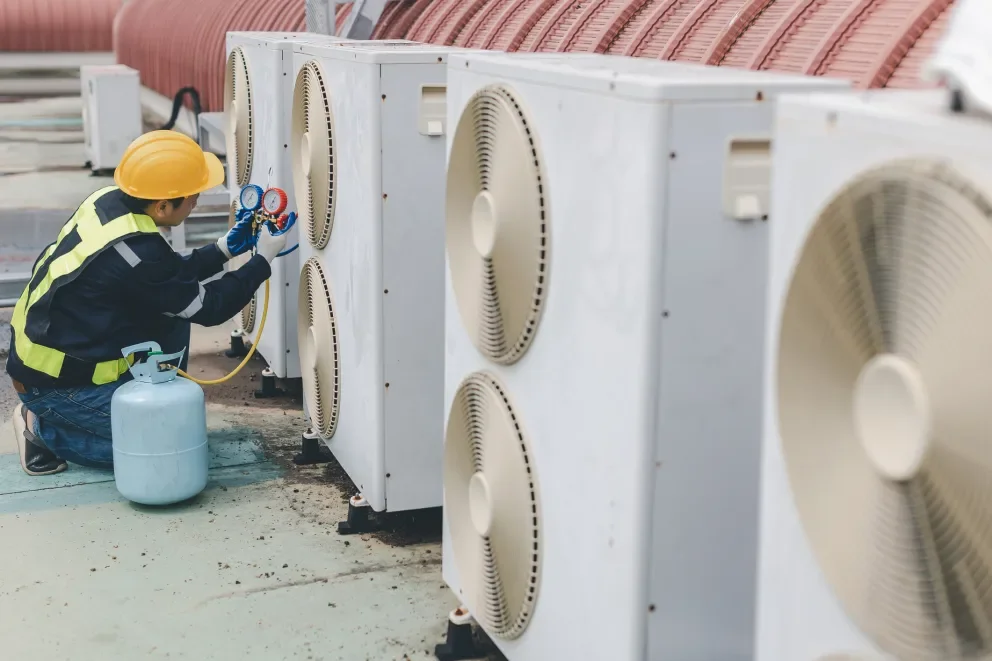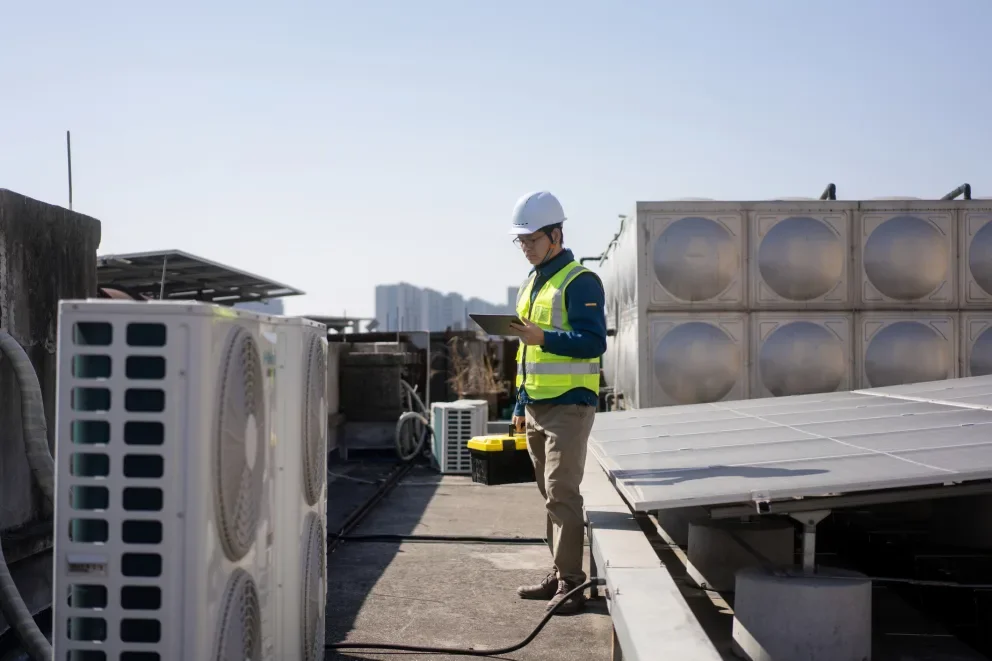The typical salary for a professional working in the HVACR (Heating, Ventilation, Air Conditioning, and Refrigeration) industry in the United States is highly dependent on a variety of factors such as expertise, location, and experience. Generally speaking, the national average salary for HVACR professionals is around $55,000 per year.
More experienced professionals may earn significantly more than this average. For example, those with a speciality in HVACR engineering may earn upwards of $90,000 per year. Those who are certified may also earn more, as their expertise is in higher demand.
Location also plays an important role in HVACR salaries. Professionals in large cities may earn significantly more than those in smaller cities. This is due to the higher cost of living in larger cities, as well as a larger demand for HVACR services.
Finally, the type of HVACR services provided also has an effect on salary. Professionals who specialize in installation may earn more than those who specialize in maintenance. This is because installation requires more technical knowledge and experience than maintenance.
In conclusion, HVACR salaries in the United States vary widely depending on a variety of factors such as expertise, location, and experience. Generally speaking, the average salary for HVACR professionals is around $55,000 per year, although experienced professionals may earn significantly more.
What qualifications are necessary to work in the HVACR industry?
In order to work in the HVACR (Heating, Ventilation, Air Conditioning, and Refrigeration) industry, individuals must typically possess certain qualifications. Generally speaking, the qualifications required to work in the industry will vary depending on the type of job being pursued.
For entry-level positions, a high school diploma or GED is typically required. Individuals may also need to obtain a certification in HVACR technology from a technical or trade school, or from an apprenticeship program. This certification will demonstrate an individual’s knowledge of HVACR systems and allow them to work as an HVACR technician.
For higher-level positions such as engineering or management roles, a bachelor’s degree in engineering or a related field is typically required. In addition, individuals may need to obtain additional certifications such as a Certified HVACR Engineer or a Certified Refrigeration Operator.
Finally, individuals should also possess certain skills in order to be successful in the HVACR industry. These skills include problem-solving, critical thinking, attention to detail, and communication. Having these skills can help individuals be successful in the industry and ensure that they are able to provide quality service.
What is the job outlook for HVACR professions in the United States?
The job outlook for HVACR (Heating, Ventilation, Air Conditioning, and Refrigeration) professions in the United States is extremely positive. The Bureau of Labor Statistics estimates that the demand for HVACR professionals will grow by 15% over the next decade, which is much faster than average for all occupations.
This increase in demand is due to a variety of factors, such as increased use of HVACR systems in commercial and residential buildings and the need for more energy-efficient systems. Additionally, the aging population of HVACR professionals is resulting in a need for new and younger workers to fill the positions.
The job prospects for HVACR professionals in the United States vary depending on location. Professionals in larger cities and metropolitan areas are likely to have the best job prospects, due to the larger pool of available jobs and higher demand for HVACR services.
In conclusion, the job outlook for HVACR professionals in the United States is extremely positive. The demand for HVACR professionals is expected to grow significantly, creating a need for new and younger workers to fill the positions. The job prospects for HVACR professionals vary depending on location, with professionals in larger cities and metropolitan areas likely to have the best job prospects.
Are there any special benefits associated with working in the HVACR industry?
Yes, there are several special benefits associated with working in the HVACR (Heating, Ventilation, Air Conditioning, and Refrigeration) industry. First, many employers offer competitive salaries and benefits packages that can help attract qualified workers. Additionally, HVACR professionals often receive specialized training and career development programs that can help them advance their careers.
HVACR professionals also have the opportunity to work in a variety of different industries, from commercial buildings to residential homes. This diversity provides job security as well as new opportunities for growth and development.
Finally, many HVACR employees also benefit from flexible work schedules. This allows workers to pick up extra shifts or take vacation days when needed, making it easier to balance work and life commitments.
In conclusion, there are a variety of special benefits associated with working in the HVACR industry. From competitive salaries and benefits packages to flexible schedules, HVACR professionals can take advantage of numerous opportunities for career growth and job stability. Additionally, the diversity of industries that utilize HVACR systems gives workers an opportunity to gain experience in multiple areas.
What are the most common types of HVACR services that professionals provide?
The most common types of HVACR (Heating, Ventilation, Air Conditioning, and Refrigeration) services that professionals provide include installation, repair, and maintenance of air conditioning systems; heating system installation, maintenance, and repair; refrigeration system installation, maintenance, and repair; ductwork design and installation; insulation services; energy audits; indoor air quality testing; mechanical ventilation assessments; zoning systems control services.
HVACR professionals may also specialize in specific areas such as commercial or residential installations. Additionally, some HVACR technicians may offer emergency service for when a system breaks down unexpectedly.
In conclusion, the most common types of HVACR services that professionals provide include installation, repair, and maintenance of air conditioning systems; heating system installation, maintenance, and repair; refrigeration system installation, maintenance, and repair; ductwork design and installation; insulation services; energy audits; indoor air quality testing; mechanical ventilation assessments; zoning systems control services. HVACR professionals may also specialize in specific areas such as commercial or residential installations. Additionally, some HVACR technicians may offer emergency service for when a system breaks down unexpectedly.
What type of training is required to be an HVACR professional?
The type of training necessary to become an HVACR (Heating, Ventilation, Air Conditioning, and Refrigeration) professional varies depending on the job requirements. Generally speaking, most employers require that potential employees have a combination of technical knowledge and hands-on experience.
Technical training typically includes courses in mathematics, applied physics, electrical engineering courses related to air conditioning systems, ductwork installation and design principles for commercial or residential applications. It may also include classes in thermodynamics or refrigeration.
In addition to technical training requirements, HVACR professionals must receive training in safety practices and regulations associated with working with hazardous materials such as refrigerant gases.
Finally, many employers prefer candidates who have completed an apprenticeship program, which usually requires a minimum of two years and consists of both classroom instruction and on-the-job experience.
In conclusion, the type of training needed to become an HVACR professional varies depending on the job requirements. Generally speaking, employers require that potential employees have a combination of technical knowledge and hands-on experience. Technical training typically includes courses in mathematics, applied physics, electrical engineering courses related to air conditioning systems, ductwork installation and design principles for commercial or residential applications. It may also include classes in thermodynamics or refrigeration. In addition to technical training requirements, HVACR professionals must receive training in safety practices and regulations associated with working with hazardous materials such as refrigerant gases. Many employers prefer candidates who have completed an apprenticeship program, which usually requires a minimum of two years and consists of both classroom instruction and on-the-job experience.
Are there any long-term career opportunities in the HVACR industry?
Yes, there are long-term career opportunities in the HVACR (Heating, Ventilation, Air Conditioning, and Refrigeration) industry. Many HVACR technicians have successful careers due to their expertise and experience. Experienced technicians may be offered job promotion opportunities such as supervisory roles or instructor positions.
HVACR technicians may also consider expanding their skillset with additional certifications such as a master’s degree in heating and air conditioning technology or building automation technician certification. This can lead to more specialized work within the field of HVACR such as energy audits or ventilation system design and installation.
Additionally, many technicians find success by opening their own companies specializing in HVACR services such as installation, repair and maintenance. This career path offers a great deal of autonomy and the potential for continued growth in an ever-evolving industry.
In conclusion, there are long-term career opportunities in the HVACR industry. Experienced technicians may be offered job promotion opportunities such as supervisory roles or instructor positions. Additionally, many technicians find success by opening their own companies specializing in HVACR services such as installation, repair and maintenance. With additional certifications or courses to enhance skill sets, the possibilities in this field are endless.
Are there any differences in salary between the different regions in the United States?
Yes, there are differences in salary between different regions in the United States for HVACR professionals. Generally speaking, salaries tend to be higher in areas where demand is higher and cost of living is also high. For example, those working in California and New York tend to earn more due to the demand for their services as well as a higher cost of living in these states.
Furthermore, regional differences can also affect salaries depending on the specific duties required of an HVACR technician. For example, technicians who work with specialized equipment such as boilers or chillers may command higher salaries than general maintenance workers who perform routine repair and installation tasks. Additionally, those working in remote locations or extreme weather conditions may receive a greater salary than their urban counterparts.
In conclusion, there are regional differences in salary for HVACR professionals across the United States. Generally speaking, salaries tend to be higher in areas where demand is higher and cost of living is also high. Furthermore, regional differences can also affect salaries depending on the specific duties required of an HVACR technician. Those working in specialized roles or with specialist equipment may receive a greater salary than general maintenance workers. Additionally, those working in remote locations or extreme weather conditions may receive a greater salary due to the added knowledge and expertise required to complete tasks effectively in these challenging locations.
Are there any advantages in working for a particular brand or company in the HVACR industry?
Yes, there are advantages to working for a particular brand or company in the HVACR industry. Many employers offer competitive salaries and benefits packages such as health insurance and retirement plans. Additionally, these companies often invest in their employees through training programs and certifications that allow them to specialize in certain types of equipment or services.
Furthermore, working for a recognizable brand or company can provide stability and security for workers within the industry. These employers usually have established customer bases which can lead to consistent job opportunities with dependable income streams. Working for a well-known organization can also open doors to more complex projects since customers may be more likely to hire technicians who represent trusted brands due to their knowledge and experience with the products and services provided.
Are there any certifications or licenses required to work in the HVACR industry?
Yes, there are certifications and/or licenses required to work in the HVACR industry. In most states, technicians must possess a valid license or certification from an accredited program before they can engage in repair or installation services for customers. Depending on the particular state requirements, these certifications may include NATE (North American Technician Excellence) certification, EPA 608 certification or other specialized skills such as refrigerant handling.
Additionally, many employers require technicians to be trained and certified in specific brands of equipment before they can provide service for them. This ensures that technicians have the necessary knowledge and experience to safely and effectively diagnose and repair complex systems while also protecting the company’s reputation with customers.



